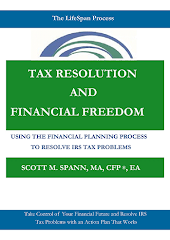One common problem in marriages is a disagreement on how to manage money. Unfortunately, comments such as “you spent how much on that?” are more common than the ultimate question- “how much should we be spending?” It is not surprising that financial disagreements are often cited as the number one reason couples end up getting divorced. Many couples struggle with the task of openly discussing their finances. The tax and financial planning process requires couples to work together to achieve a common goal of financial freedom. This means that both parties need to take action and make the commitment to change financial behaviors.
Money and taxes should not be viewed as an issue of mine and yours. As a couple you should view everything as an “ours” issue. Talking about money with anyone can be very difficult because money is such a taboo subject in American culture. When that special someone is your spouse the talk can be even more complicated.
Why does money have such a powerful impact on our relationships? This is a difficult question that I encourage couples to explore. Money represents different things to each partner. One partner may view money as a symbol of power and success. The other may see money as a symbol of comfort and security. If the topic of dealing with tax or financial matters and thus taking control of personal finances makes one or both parties emotionally uncomfortable or defensive, you should seek the help of a financial planner or financial counselor. Professional counseling is also available for couples experiencing problems communicating about money.
Make a commitment to one another to handle your tax or financial problems as a couple. This is especially important if debt or other financial problems were assumed prior to the marriage or a non-liable spouse is involved. Simply determining that your partner’s debt is not your problem is not an effective alternative. Blaming will also do nothing to help the situation. Other unhealthy habits include sabotaging personal spending plans by secret spending or hiding financial decisions from the other spouse.
Each spouse should be accountable to the other. Aim to create a tax and financial plan that works for both of you. Make sure that the commitment to work toward financial freedom is a vision that you both share. If only one person is doing the work then you have a major problem brewing.
Communicating About Money
How we communicate with each another can be just as important as the message you are trying to get across to the other person. If you have a recent history of tax or financial problems it is easy to let emotions and the past take over the discussion. When talking to a spouse or significant other about money it is also easy for things to get lost in translation. Always be aware of how you are actually communicating with a spouse or loved one about money matters. Never forget that how you say things is just as important as what you actually say. Talking about money is not something that comes easily for most people. Try following these basic communication tips when talking about taxes and money matters.
1. Set a date
Schedule a convenient time to talk about money. Try to pick a time during the week when you are both available to have a calm discussion free from any distractions (e.g., no children, no television).
2. Establish open lines of communication
Remember that what you say is sometimes not as important as how you say it. Use “I” messages to improve communication.
3. Talk about your life experience with money
What lessons did you learn early in life about money?
4. Give and Take
If you are going to ask your spouse to sacrifice something you need to be willing to do the same.
5. Set boundaries on what can and cannot be discussed
Stay focused. Do not bring up off-limit topics.
6. Avoid secret-spending
Be open and honest with your spouse.
7. Agree on a personal spending plan
A budget or personal spending plan will not work unless you both work the plan together.
8. Discuss your financial matters on a regular basis
This is a key element to staying focused and on track.
9. Seek professional assistance if necessary
Know when to seek assistance. If you cannot talk to your spouse or significant other about money then you may need help. Marital counselors and financial life planners can both be helpful.
Monday, August 3, 2009
Subscribe to:
Post Comments (Atom)





No comments:
Post a Comment